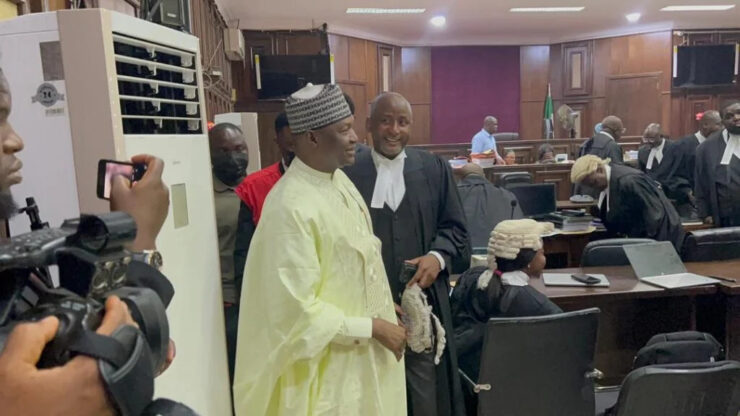Following the official launch of Premium Motor Spirit (PMS) production at the Dangote Petroleum Refinery, oil marketers are eagerly awaiting the announcement of the fuel’s price.
The $20 billion refinery, located in Lagos’ Lekki Free Trade Zone, commenced petrol production with a 650,000-barrels-per-day capacity.
However, the Independent Petroleum Marketers Association of Nigeria (IPMAN) revealed that its members have yet to receive pricing information from the refinery.
Alhaji Aliko Dangote, President of Dangote Group, confirmed the refinery’s production start.
The price announcement will significantly impact Nigeria’s fuel market, influencing: competition among oil marketers, fuel affordability for consumers, local production versus importation dynamics.
“We have not received any notice about its PMS price because he categorically stated that the NNPC is the sole off-taker of the product, which to us came as a surprise,” National Publicity Secretary of IPMAN, Ukadike Chinedu, stated.
He added, “We had expected Dangote to open up the market for proper competition. This shows that all these while the NNPC has been waiting for Dangote to release products, as it had reduced PMS importation.
“However, we are still waiting for them to tell us the price, but this, of course, will have its effect on the pricing of the product considering the fact that the cost of the commodity has increased at NNPC retail stations.”
There are strong indications that the price of petrol may hit N1,200/litre following the decision of NNPC to raise the pump price at its stations on Tuesday.
This is even as the Dangote oil refinery announced its determination to supply 25 million litres of PMS daily in September.
Nigerians woke up on Tuesday to see a change in the pump prices, from around N600 to N855/litre, M918/litre and above, depending on the area of purchase at NNPC stations nationwide.
Repot also had it that there was a directive to the retail outlets to increase petrol prices.
It was gathered that the recommended petrol prices vary by location, as some now sell at N900.
It was confirmed on Tuesday that NNPC outlets in Lagos increased their price to N855/litre.
The directive to raise petrol prices stated that the NNPC Retail Management approved an upward review.
This is coming barely two days after the company admitted it was having challenges to import fuel due to a $6bn debt.
However, the spokesperson of the NNPC, Olufemi Soneye, declined comments when contacted him.
When told (by The Punch) that the statement had been making the rounds on WhatsApp and reports from NNPC filling stations showed a rise in fuel prices, he replied, “Thank you for reaching out. I have no comment on the matter at this time. If there are any updates, I will make sure to inform you.”
It was gathered from depot operators that N250 has been added to the pump price.
It was observed that some major marketers have also jerked up their pump prices close to 900/litre.
The North West filling station in Onigbongbo, Lagos sold at N920 while Amuf in Ibafo, Ogun State sold for N1,000 per litre.
It was observed that the sudden price rise caused tension among motorists, who rushed to filling stations to engage in panic buying.
In Lagos, the few stations selling petrol had long queues, leading to traffic gridlocks in different locations.
It was also observed that many filling stations did not open for business while many marketers refused to lift fuel.
An official of a petroleum company at Apapa confirmed to our correspondent that no marketer was in their depot to load petrol as of 2pm on Tuesday.
This he described as unusual, saying many marketers may not be able to afford the new price.
Before now, NNPC used to sell petrol to major marketers below N600/litre, while the independent marketers bought from private depots for about N900.
While there are fears that the private depots may face tougher challenges with this new price, black marketers sold the rpouct at N2,000/litre on Tuesday in Lagos.
Some black marketers, who spoke with one of our correspondents at Victoria Island, Lagos, offered to sell five litres of petrol at N15,000. During price negotiation, they rejected N8,000, insisting that the least the five litres could go was N10,000.
The Nigerian Midstream and Downstream Petroleum Regulatory Authority disclosed on Tuesday that the Dangote oil refinery will supply a total of 25 million litres of petrol to the Nigerian market daily in September.
The NMDPRA said this will rise to 30 million litres from October.
In a short statement, the NMDPRA said it met with the NNPC to agree on local crude supply to the refinery.
“At the NMDPRA headquarters in Abuja, NNPCL reached an agreement to commence crude oil sale and supply to Dangote Refinery in local currency.
“The refinery is now poised to supply an initial 25 million litres of PMS into the domestic market this September. And will subsequently increase this amount to 30 million litres daily from October 2024,” the NMDPRA said on its X.
The PUNCH reports that the President of the Dangote Group, Alhaji Aliko Dangote, formally announced on Tuesday that the 650,000-capacity oil refinery had commenced petrol production.
Dangote, who spoke at the refinery, said the supply of petrol to Nigeria would change the country’s energy landscape.
While appreciating President Bola Tinubu for approving the sale of crude in naira to local refineries, Dangote said many did not believe that the $20bn refinery could start petrol production.
He said the capacity of the refinery would meet local demands and the demands of sub-Saharan Africa.
Dangote disclosed that the petrol would get to filling stations in 48 hours after all arrangements with the NNPC were concluded, saying the queues would soon be over.
“Our PMS can be in filling stations within the next 48 hours depending on NNPCL,” he said.
“We are ready, and I want to appreciate President Bola Tinubu for making to achieve this monumental feat.
“I pray that within the next few days, you won’t see any petroleum queues as soon as we finalise with NNPC. We are ready x we are waiting for them and I hope they will be ready like yesterday.”
Dangote told newsmen that he would not be able to disclose the price of the product, saying the NNPC was in a position to control the price.
“On the pricing, I can’t say anything because we don’t control the pricing; the pricing, at the moment, is controlled by NNPC, not Dangote. We will wait for them. But our own for now is to make sure that the product is available and round-tripping is stopped.
“People are just taking dollars out and not bringing the product. Most of the shenanigans will stop, that’s what I can guarantee you,” he stated.
Dangote emphasised that NNPC was the company that would sell and distribute the product under the current naira crude sale arrangement.
“Once the NNPC is ready, we roll. We are even ready to load a ship this week,” he added.
He said Tinubu would deal ruthlessly with anyone who tried to stop the order that crude be supplied to local refineries.
Speaking further, the business mogul said the petrol and diesel from his refinery were clearer because they were of Euro 5 standard.
He said the fuel would have less emissions, saying it is good for the people’s health and engines.
“This is the sample of the petrol. You see it as a different colour, but that is the real deal. You are now going to have a good and genuine product. I am sure Nigerians have not seen this colour of diesel before. This is called Euro 5 diesel. It contains less than 10 parts per million of sulphur. This will help vehicles, engines, and generators last longer.
“The health of the people and the environment will not be compromised. This is the real deal,” he stated.
He also added that the Federal Executive Council was working on a new pricing arrangement for petrol produced from the Dangote Refinery.
“It is an arrangement which is designed and approved by the Federal Executive Council led by His Excellency, President Bola Ahmed Tinubu.
“As soon as it is finalised, which he (Tinubu) is pushing, once we finish with NNPC, it can be today, it can be tomorrow, we are ready to roll into the market,” he said.
Dangote explained why the first sample of petrol from his refinery appears clearer than the petrol currently in circulation.
“This is the sample of the petrol. You see it as a different colour, but that is the real deal. You are now going to have a good and genuine product,” he said
Meanwhile, the Organised Private Sector said the hike in petrol price, which signalled the removal of subsidy on the commodity, would lead to another round of inflation nationwide.
Following the sudden increase in petrol prices, NNPC stations adjusted their pump prices from N750 to N950/litre while independent marketers sold fuel for between N1,400 and N1,500/litre in Kano.
Motorists in Sokoto and Kebbi states expressed shock after NNPC stations adjusted the price of a litre of petrol from N620 to N900 in both states.
A motorist, Shehu Salman, said “Honestly, this government has really shown its hatred for the masses. How can they increase the price of petrol at this period, when citizens are finding it hard to feed themselves?”
In Yola, the Adamawa capital, NNPC stations sold a litre for N1,000, with other stations selling between N1,200 and N1,300/litre.
In Maiduguri, NNPC sold at N897, others dispensed at N1,100.
Following the news of NNPC increasing fuel pump prices nationwide, Katsina State NNPC mega stations sold at N902/litre, which sold for N665 on Monday.
The NNPC fuel stations in Ilorin, the Kwara State capital, closed hurriedly following news of the increase in fuel price.
Two of the NNPC stations at Odota and Asa Dam road, which were selling fuel to early on Tuesday, reportedly closed and told vehicles on the queue to go out of the stations after learning of the new fuel price.
However, some independent marketers sold the product for N1,100 and N1,200/litre.
Most filing stations in Ibadan, the Oyo State capital, on Tuesday adjusted upward the pump price of petrol, with independent marketers dispensing the product at N1,000 and N1,100/litre, with long vehicular queues.
An attendant at one of the NNPC substations said, “We have not received any directive that we should start selling fuel above N580 per litre.”
NNPC substations on Tuesday implemented the new pump price of N865 per litre in Ogun State.
One of our correspondents learnt that independent marketers adjusted their pump price from N850 to N980 and above.
On Tuesday in Rivers, NNPC mega stations dispensed N509/litre, while other filling stations in the state sold at N1,100.
In Edo State, the NNPC station on Sapele Road increased their pump prize from N591 to N881/litre, but had no product to sell to motorists who besieged the station.
However, other petrol stations sold the product for between N970 and N1,000/litre. In Bayelsa, NNPC sold the product for N890/litre, while prices of others ranged from N990 to N1200, which triggered an increase in transport fares in Yenagoa, the capital city.
In Asaba, the Delta State capital, NNPC mega station along Asaba-Benin road sold fuel for N850/litre, while ther filling stations dispensed for between N950 and N1,100/litre.
NNPC stations sold at N850/litre in Imo State, while other independent marketers sold at N999.
“The removal of subsidies is expected to lead to an increase in petrol prices, causing higher costs for consumers and businesses that rely on fuel. This could contribute to higher inflation,” the President of the Nigerian Association of Chambers of Commerce, Industry, Mines, and Agriculture, Dele Oye, said.
He added, “Higher fuel prices may put a strain on household budgets, especially for lower-income families who spend a larger portion of their income on transportation and essential goods.
“Businesses may need to pass on some of the increased fuel costs to customers, which could impact the prices of goods and services. The government has said that targeted cash transfers or other support measures may be introduced to help mitigate the impact on the most vulnerable populations.
“Ultimately, the full economic and social effects will depend on factors like the magnitude of the price increase, the government’s response, and how consumers and businesses adapt. We advise the government to avoid another increase, as the average Nigerian is already overburdened by the effect of currency devaluation and fluctuations, which has resulted in hyperinflation.”
Also, the Nigerian Association of Small-Scale Industrialists decried the inconsistency in policy over subsidy removal on petrol.
The National Vice President of the Nigerian Association of Small-Scale Industrialists, Segun Kuti-George, said the Federal Government’s earlier position on subsidy removal was different from the recent developments leading up to a possible fuel price hike.
“I’m not sure where the idea of subsidy is coming from again. I’m saying this because I thought that we had removed the subsidy. There is a great deal of inconsistency there,” Kuti-George asserted.
“In the very first minute of this government, they said subsidy is gone. So what subsidy are we talking about now?”
Kuti-George noted that the Federal Government’s failure to officially announce a return of oil subsidy through back channels has made it hard to properly assess the impact of the removal of the subsidy.
“They did not tell us that the subsidy had returned through the back door. The last thing we had was the subsidy was gone. So how and when did the subsidy come back? That’s the idea. Let us now leave all this and say, okay, the subsidy is now just going. It is now just going,” he added.
Kuti-George said a possible hike in fuel prices would mean harder times for people and businesses.
He decried the progression in PMS prices, as he noted that “a litre went for N950 in the previous day and since the NNPC recently announced a selling price of N885, it will amount to over N300, (higher than) what they were selling before.”
“We should be expecting something from between N1,300 and between N1,100 and N1,500 per litre,” the NASSI Vice President added.
According to The Punch, the Director-General of the Nigeria Employers’ Consultative Association (NECA), Adewale-Smatt Oyerinde, said, “The new pump price of petrol is not only worrisome but also unfair.
“We had expected that the Government will leverage on the momentum created by the completion of the Dangote refinery and the planned commencement of operation of the Port-Harcourt refinery to clear the obvious self-inflicted pain on Nigerians and progressively reduce the pump price of petrol. This seems not to be the case.”
According to Oyerinde, the new pump price could be seen as making Nigerians pay for the crass inefficiency in the NNPC.
“Rather than address the fundamentals that have made Nigeria a net importer of petrol, even when we have four refineries, the Government continues to inflict pain on Nigerians and inadvertently, contributing to the increase in cost of doing business,” Oyerinde mentioned.
“We urge that Government should have a rethink and do all that is necessary to address the continuous impoverishment of Nigerians and incapacitation of organized businesses,” the NECA boss stated.
Credit: The Punch
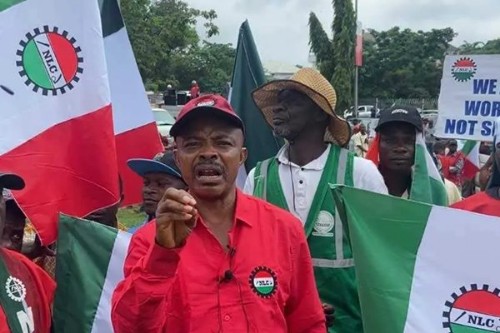

 ENTERTAINMENT3 days ago
ENTERTAINMENT3 days ago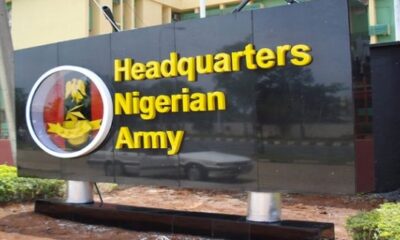
 BIG STORY4 days ago
BIG STORY4 days ago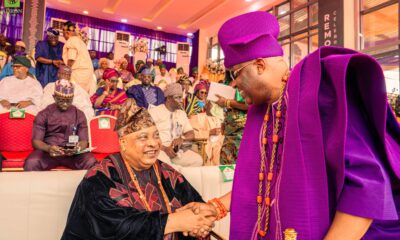
 ENTERTAINMENT2 days ago
ENTERTAINMENT2 days ago
 BIG STORY1 day ago
BIG STORY1 day ago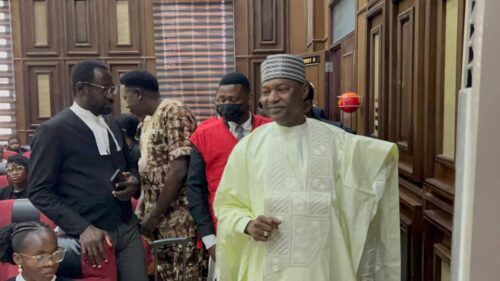
 BIG STORY7 hours ago
BIG STORY7 hours ago
 BIG STORY4 days ago
BIG STORY4 days ago
 BIG STORY10 hours ago
BIG STORY10 hours ago
 NEWS3 days ago
NEWS3 days ago


















